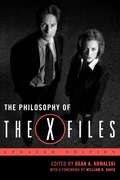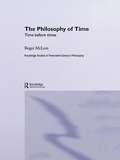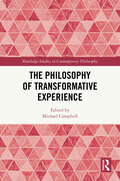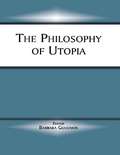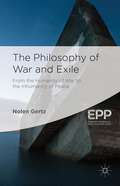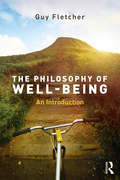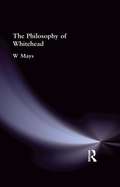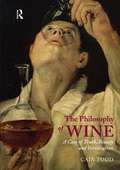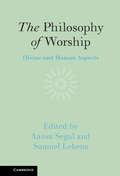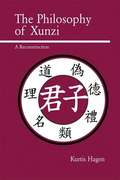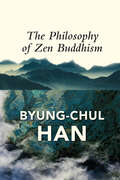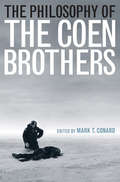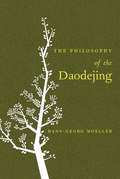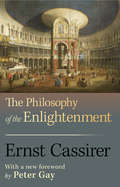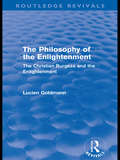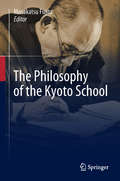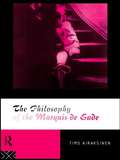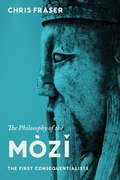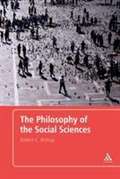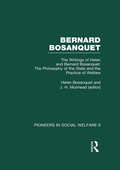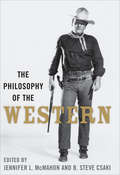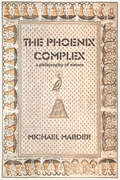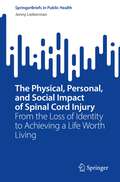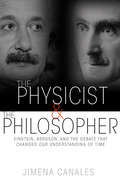- Table View
- List View
The Philosophy of The X-Files: Updated Edition (The Philosophy of Popular Culture #Ppcs)
by Dean A. KowalskiLearn to search for the truth that&’s out there in essays about what &“may be the most philosophically challenging series in the history of television&” (Paul A. Cantor, author of Gilligan Unbound: Pop Culture in the Age of Globalization). In The Philosophy of The X-Files, Dean A. Kowalski has gathered a remarkable cast of contributors to shed light on the philosophical mysteries of the television show The X-Files. With sections devoted to the show&’s credos—&“The truth is out there,&” &“Trust no one,&” and &“I want to believe&” —as well as individual characters and specific episodes, The Philosophy of The X-Files illuminates the philosophical assumptions and presuppositions of the show and provides a lively, accessible way to better understand philosophy and philosophical inquiry—while exploring topics ranging from alienation to determinism to democracy.
The Philosophy of Time: Time before Times (Routledge Studies in Twentieth-Century Philosophy)
by Roger McLureThe question of the existence and the properties of time has been subject to debate for thousands of years. This considered and complete study offers a contrastive analysis of phenomenologies of time from the perspective of the problematics of the visibility of time. Is time perceptible only through the veil of change? Or is there a naked presence of 'time itself'? Or has time always effaced itself?McClure's new work also stages confrontations between phenomenology of time and analytical philosophy of time. By doing so he explores ancient issues from a fresh perspective, such as whether time passes, whether experimental time is 'real time', and whether the very concept of time is contradictory.
The Philosophy of Transformative Experience (Routledge Studies in Contemporary Philosophy)
by Michael CampbellThis volume examines the nature and significance of transformative experiences as they occur across a variety of contexts in human life. By treating these events as social as well as individual phenomena, the essays bring to light the various ways in which cultural and institutional forces influence narratives of personal change. The ease with which we identify transformative experiences shows their importance for our sense of the potentialities inherent in human life, even while their disruptive character threatens confidence in our capability to make rational decisions concerning our future well-being. Yet, narratives of transformation are not just individual artefacts, but are also given support and structure through social forces including shared languages, practices, and institutions. What are the cultural and institutional contexts which enable this form of self-conceptualisation, and what happens when social changes undermine the cogency of these narratives? The chapters in this volume investigate these issues through a blend of philosophical theory and applied cases, working across the disciplinary boundaries of philosophy and social anthropology. Contributors investigate topics including recovery from trauma; the role of narratives in gender transition; climate activism; the ethical ramifications of war; the role of media in framing narratives of ethical change; and the university as a site of transformative experience. The Philosophy of Transformative Experience will be of interest to philosophers working in ethics, political philosophy, and decision theory, as well as scholars and advanced students in anthropology, sociology, and literary studies.
The Philosophy of Utopia
by Barbara GoodwinThis collection addresses the important function of utopianism in social and political philosophy and includes debate on what its future role will be in a period dominated by dystopian nightmare scenarios.
The Philosophy of War and Exile
by Nolen GertzArguing that the suffering of combatants is better understood through philosophy than psychology, as not trauma, but exile, this book investigates the experiences of torturers, UAV operators, cyberwarriors, and veterans to reveal not only the exile at the core of becoming a combatant, but the evasion from exile at the core of being a noncombatant.
The Philosophy of Well-Being: An Introduction
by Guy FletcherWell-being occupies a central role in ethics and political philosophy, including in major theories such as utilitarianism. It also extends far beyond philosophy: recent studies into the science and psychology of well-being have propelled the topic to centre stage, and governments spend millions on promoting it. We are encouraged to adopt modes of thinking and behaviour that support individual well-being or 'wellness'. What is well-being? Which theories of well-being are most plausible? In this rigorous and comprehensive introduction to the topic, Guy Fletcher unpacks and assesses these questions and many more, including: Are pleasure and pain the only things that affect well-being? Is desire-fulfilment the only thing that makes our lives go well? Can something be good for someone who does not desire it? Is well-being fundamentally connected to a distinctive human nature? Is happiness all that makes our lives go well? Is death necessarily bad for us? How is the well-being of a whole life related to well-being at particular times? Annotated further reading and study and comprehension questions follow each chapter, and a glossary of key terms is also included, making The Philosophy of Well-Being essential reading for students of ethics and political philosophy. This title is also suitable for those in related disciplines such as psychology, politics and sociology.
The Philosophy of Whitehead (Muirhead Library Of Philosophy Ser.)
by Mays, WFirst published in 2002. Routledge is an imprint of Taylor & Francis, an informa company.
The Philosophy of Wine: A Case of Truth, Beauty and Intoxication
by Cain ToddDoes this Bonnes-Mares really have notes of chocolate, truffle, violets, and merde de cheval? Can wines really be feminine, profound, pretentious, or cheeky? Can they express emotion or terroir? Do the judgements of 'experts' have any objective validity? Is a great wine a work of art? Questions like these will have been entertained by anyone who has ever puzzled over the tasting notes of a wine writer, or been baffled by the response of a sommelier to an innocent question. Only recently, however, have they received the serious philosophical attention they deserve. Touching on issues in metaphysics, epistemology, the philosophy of mind, and aesthetics, this book provides a clear and engaging discussion of the philosophical significance of wine that will be accessible to all wine lovers, specialists and non-specialists alike. The author offers throughout a sustained defence of the objectivity of wine judgements, a demystification of the nature of expertise, and a theory of the aesthetic value of wine and its appreciation.
The Philosophy of Worship: Divine and Human Aspects
by Aaron Segal Samuel LebensWorship is central to the lives of billions of people worldwide. Yet, despite the recent flourishing of analytical philosophy of religion, there has been very little attention paid to the philosophical questions raised by worship. This book is the first volume to explore the philosophy of worship. Written in a clear style that eschews unnecessary technical jargon, it considers the metaphysical, ethical, and psychological issues associated with worship, among them: What, if anything, is the point of worship? What, if anything, makes a being worthy of worship? Can worship hold value for atheists? What, if anything, might be wrong with idolatry? These questions, and more, sit at the heart of this book. With contributions from world renowned philosophers and important early career voices, this volume sets the agenda for future work in the philosophy of worship.
The Philosophy of Xunzi: A Reconstruction
by Kurtis Hagen<i>The Philosophy of Xunzi</i> sheds light on the teachings of a disciplined thinker who contradicted conventional schools of Confucian thought. Living in a time of great instability and discord, Xunzi came to believe that man’s desires, if left unchecked, would lead to ruin, and so advocated a system of strict societal controls. His best-known disciple took a more extreme stance, likely coloring history’s view of Xunzi. This new examination of his complex, sometimes harsh ideas, uncovers a deeper humanity and a restrained optimism in his writings, giving them new relevance for present-day Confucians and Western thinkers.
The Philosophy of Zen Buddhism
by Byung-Chul HanZen Buddhism is a form of Mahāyāna Buddhism that originated in China and is strongly focused on meditation. It is characteristically sceptical towards language and distrustful of conceptual thought, which explains why Zen Buddhist sayings are so enigmatic and succinct. But despite Zen Buddhism&’s hostility towards theory and discourse, it is possible to reflect philosophically on Zen Buddhism and bring out its philosophical insights. In this short book, Byung-Chul Han seeks to unfold the philosophical force inherent in Zen Buddhism, delving into the foundations of Far Eastern thought to which Zen Buddhism is indebted. Han does this comparatively by confronting and contrasting the insights of Zen Buddhism with the philosophies of Plato, Leibniz, Fichte, Hegel, Schopenhauer, Nietzsche, Kierkegaard, Heidegger and others, showing that Zen Buddhism and Western philosophy have very different ways of understanding religion, subjectivity, emptiness, friendliness and death. This important work by one of the most widely read philosophers and cultural theorists of our time will be of great value to anyone interested in comparative philosophy and religion.
The Philosophy of the Coen Brothers (The Philosophy of Popular Culture #Ppcs)
by Mark T. Conard&“Written for both fans of the Coen brothers and the philosophically curious, without the technical language . . . educational and entertaining.&” —Library Journal Joel and Ethan Coen have made films that redefined the gangster movie, the screwball comedy, the fable, and the film noir, but no matter what genre they&’re playing with, they consistently focus on the struggles of complex characters to understand themselves and their places in the strange worlds they inhabit. To borrow a phrase from Barton Fink, all Coen films explore &“the life of the mind&” and show that the human condition can often be simultaneously comic and tragic, profound and absurd. The essays in this book explore the challenging moral and philosophical terrain of the Coen repertoire. Several address how Coen films often share film noir&’s essential philosophical assumptions: power corrupts, evil is real, and human control of fate is an illusion. In Fargo, not even Minnesota&’s blankets of snow can hide Jerry Lundegaard&’s crimes or brighten his long, dark night of the soul. The tale of love, marriage, betrayal, and divorce in Intolerable Cruelty transcends the plight of the characters to illuminate competing theories of justice. Even in lighter fare, such as Raising Arizona and The Big Lebowski, the comedy emerges from characters&’ journeys to the brink of an amoral abyss. However, the Coens often knowingly and gleefully subvert conventions and occasionally offer symbolic rebirths and other hopeful outcomes. At the end of The Big Lebowski, for example, the Dude abides, his laziness has become a virtue, and the human comedy is perpetuating itself with the promised arrival of a newborn Lebowski. The Philosophy of the Coen Brothers sheds new light on the work of these cinematic visionaries. From Blood Simple to No Country for Old Men, the Coens&’ characters look for answers—though in some cases, their quest for answers leads, at best, only to more questions.
The Philosophy of the Daodejing: The New, Highly Readable Translation Of The Life-changing Ancient Scripture Formerly Known As The Tao Te Ching (Philosophy)
by Hans-Georg MoellerFor centuries, the ancient Chinese philosophical text the Daodejing (Tao Te Ching) has fascinated and frustrated its readers. While it offers a wealth of rich philosophical insights concerning the cultivation of one's body and attaining one's proper place within nature and the cosmos, its teachings and structure can be enigmatic and obscure. Hans-Georg Moeller presents a clear and coherent description and analysis of this vaguely understood Chinese classic. He explores the recurring images and ideas that shape the work and offers a variety of useful approaches to understanding and appreciating this canonical text. Moeller expounds on the core philosophical issues addressed in the Daodejing, clarifying such crucial concepts as Yin and Yang and Dao and De. He explains its teachings on a variety of subjects, including sexuality, ethics, desire, cosmology, human nature, the emotions, time, death, and the death penalty. The Daodejing also offers a distinctive ideal of social order and political leadership and presents a philosophy of war and peace.An illuminating exploration, The Daodejing is an interesting foil to the philosophical outlook of Western humanism and contains surprising parallels between its teachings and nontraditional contemporary philosophies.
The Philosophy of the Enlightenment
by Ernst Cassirer Peter GayThe present book aims to be both more and less than a monograph on the philosophy of the Enlightenment. It is much less, for the primary task of such a monograph would be to offer the reader a wealth of detail and to trace the genesis and development of all the special problems of this philosophy.
The Philosophy of the Enlightenment: The Christian Burgess and the Enlightenment (Routledge Revivals)
by Lucien GoldmannIn this reissue, originally published in English in 1973, French philosopher Lucien Goldmann turns his attention to the Enlightenment of the eighteenth century, the great age of liberalism and individualism and analyses the ‘mental structures’ of the outlook of the philosophes, who showed that the ancien regime and the privileges of the Church were irrational anachronisms. In assessing the strengths and limitations of individualism, Goldmann considers the achievements and limitations of the Enlightenment. He discusses the views of Hegel and Marx and examines the relation between liberal scepticism and traditional Christianity to point the way to the possible reconciliation of the two seemingly incompatible ‘world visions’ of East and West today.
The Philosophy of the Kyoto School
by Masakatsu FujitaThe main purpose of this book is to offer to philosophers and students abroad who show a great interest in Japanese philosophy and the philosophy of the Kyoto school major texts of the leading philosophers. This interest has surely developed out of a desire to obtain from the thought of these philosophers, who stood within the interstice between East and West, a clue to reassessing the issues of philosophy from the ground up or to drawing new creative possibilities.The present condition seems to be, however, that the material made available to further realize this kind of intellectual dialogue is far too scarce. This book is intended to be of some help in this regard.The book presents selected texts of representative philosophers of the Kyoto school such as Nishida Kitaro, Tanabe Hajime, Miki Kiyoshi, Nishitani Keiji, and others who best illustrate the characteristics of this school, and works that together portray its image as a whole. Those who are interested in Japanese philosophy or specifically the philosophy of the Kyoto School can survey a comprehensive representation from this book.These texts are, of course, quite difficult and cannot be well understood without sufficient preliminary knowledge. Expository essays have therefore been included after each text to provide guidance. In each of these commentaries a scholar of our time with deep understanding of the philosopher in question has provided an account of his life, intellectual journey, and the significance of the text included here.From this book will emerge a new dialogue of ideas that in turn will engender new developments in philosophy, thereby further expanding the network of philosophical thought worldwide.
The Philosophy of the Marquis de Sade
by Timo AiraksinenThe Marquis de Sade is famous for his forbidden novels like Justine, Juliette, and the 120 Days of Sodom. Yet, despite Sade's immense influence on philosophy and literature, his work remains relatively unknown. His novels are too long, repetitive, and violent. At last in The Philosophy of the Marquis de Sade, a distinguished philosopher provides a theoretical reading of Sade. Airaksinen examines Sade's claim that in order to be happy and free we must do evil things. He discusses the motivations of the typical Sadean hero, who leads a life filled with perverted and extreme pleasures, such as stealing, murder, rape, and blasphemy. Secondary sources on Sade, such as Hobbes, Erasmusm, and Brillat-Savarin are analyzed, and modern studies are evaluated. The Philosophy of the Marquis de Sade greatly enhances our understanding of Sade and his philosophy of pain and perversion.
The Philosophy of the Mòzi: The First Consequentialists
by Chris FraserMohism was an ancient Chinese philosophical movement founded in the fifth century BCE by the charismatic artisan Mòzi, or "Master Mo." Its practitioners advanced a consequentialist ethics, along with fascinating political, logical, and epistemological theories, that set the terms of philosophical argumentation and reflection in China for generations to come. Mohism faded away in the imperial era, leaving the impression that it was not as vital as other Chinese philosophical traditions, yet a complete understanding of Confucianism or Daoism is impossible without appreciating the seminal contribution of Mohist thought.The Philosophy of the Mòzi is an extensive study of Mohism, situating the movement's rise and decline within Chinese history. The book also emphasizes Mohism's relevance to modern systems of thought. Mohism anticipated Western utilitarianism by more than two thousand years. Its political theory is the earliest to outline a just war doctrine and locate the origins of government in a state of nature. Its epistemology, logic, and psychology provide compelling alternatives to contemporary Western mentalism. More than a straightforward account of Mohist principles and practice, this volume immerses readers in the Mohist mindset and clarifies its underpinning of Chinese philosophical discourse.
The Philosophy of the Mòzĭ: The First Consequentialists
by Chris FraserMohism was an ancient Chinese philosophical movement founded in the fifth century BCE by the charismatic artisan Mòzi, or "Master Mo." Its practitioners advanced a consequentialist ethics, along with fascinating political, logical, and epistemological theories, that set the terms of philosophical argumentation and reflection in China for generations to come. Mohism faded away in the imperial era, leaving the impression that it was not as vital as other Chinese philosophical traditions, yet a complete understanding of Confucianism or Daoism is impossible without appreciating the seminal contribution of Mohist thought. The Philosophy of the Mòzi is an extensive study of Mohism, situating the movement's rise and decline within Chinese history. The book also emphasizes Mohism's relevance to modern systems of thought. Mohism anticipated Western utilitarianism by more than two thousand years. Its political theory is the earliest to outline a just war doctrine and locate the origins of government in a state of nature. Its epistemology, logic, and psychology provide compelling alternatives to contemporary Western mentalism. More than a straightforward account of Mohist principles and practice, this volume immerses readers in the Mohist mindset and clarifies its underpinning of Chinese philosophical discourse.
The Philosophy of the Social Sciences: An Introduction
by Robert BishopThe book not only offers lucid and incisive coverage of the philosophy of the social sciences, but also extends the major debates and considers the latest directions in this growing area of philosophical interest. Robert C. Bishop's cogent and rigorous analysis is supplemented by useful pedagogical features, including key examples from philosophical writing; summaries of core debates; sample questions and exercises; and guides for further reading.
The Philosophy of the State and the Practice of Welfare: The Writings of Bernard and Helen Bosanquet
by David Gladstone J. H. Muirhead Helen BosanquetUnemployment, poverty and the role of the state were themes which structured the discourse of social theory and the developing social legislation in Britain at the end of the Victorian period and the early twentieth century. This collection examines the neglected contribution of Bernard and Helen Bosanquet to that contemporary maelstrom of ideas about the condition of the people, the process of social reform and the practice of social work. Like their contemporaries Sidney and Beatrice Webb, the Bosanquets were a significant partnership integrating philosophy and practice, theory and action. Bernard Bosanquet, the Idealist philosopher, is best known for his study The Philosophical Theory of the State. His wife Helen, economist and social worker, was a member of the Royal Commission on the Poor Laws (1905-9) and between 1909 and 1921, editor of the Charity Organisation Review. Themselves selective supporters of state welfare schemes, they helped to re-fashion the Charity Organisation Society away from its nineteenth century individualism by their advocacy of organic social collectivism. But character, self development and responsibility remained central tenets of their welfare programme. This collection re-publishes most of the Bosanquets' principal books and articles relating to the philosophy of the state and the practice of welfare. The development of their ideas in the context of their own time, and their relevance to current debates in the theory and practice of welfare, forms the basis of a substantial introduction by David Gladstone, the series editor. This Volume charts the life of Bernard Bosanquet.
The Philosophy of the Western (The Philosophy of Popular Culture #Ppcs)
by Jennifer L. McMahon and B. Steve CsakiEssays about how stories of the Old West reflect—and affect—our beliefs and values.The solitude of the lone rider, the loyalty of his horse, and the unspoken code of the West—for many, Western movies embody America and its values, though the view of the country&’s history they present isn&’t always accurate. In recent years, scholars had declared the genre dead, but a steady resurgence of western themes in literature, film, and television has reestablished its importance and influence.In The Philosophy of the Western, editors Jennifer L. McMahon and B. Steve Csaki examine philosophical themes in the western genre. Investigating subjects of nature, ethics, identity, gender, environmentalism, and animal rights, the essays in this volume draw from a wide range of westerns including the more recent popular and critical successes Unforgiven, All the Pretty Horses, 3:10 to Yuma, and No Country for Old Men, as well as literature and television serials such as Deadwood. The Philosophy of the Western reveals the powerful role of the western in the American psyche.
The Phoenix Complex: A Philosophy of Nature
by Michael MarderAn innovative, wide-ranging consideration of the global ecological crisis and its deep philosophical and theological roots.Global crises, from melting Arctic ice to ecosystem collapse and the sixth mass extinction, challenge our age-old belief in nature as a phoenix with an infinite ability to regenerate itself from the ashes of destruction. Moving from antiquity to the present and back, Michael Marder provides an integrated examination of philosophies of nature drawn from traditions around the world to illuminate the theological, mythical, and philosophical origins of the contemporary environmental emergency. From there, he probes the contradictions and deadlocks of our current predicament to propose a philosophy of nature for the twenty-first century.As Marder analyzes our reliance on the image and idea of the phoenix to organize our thoughts about the natural world, he outlines the obstacles in the path of formulating a revitalized philosophy of nature. His critical exposition of the phoenix complex draws on Chinese, Indian, Russian, European, and North African traditions. Throughout, Marder lets the figure of the phoenix guide readers through theories of immortality, intergenerational and interspecies relations, infinity compatible with finitude, resurrection, reincarnation, and a possibility of liberation from cycles of rebirth. His concluding remarks on a phoenix-suffused philosophy of nature and political thought extend from the Roman era to the writings of Hannah Arendt.
The Physical, Personal, and Social Impact of Spinal Cord Injury: From the Loss of Identity to Achieving a Life Worth Living (SpringerBriefs in Public Health)
by Jenny LiebermanThis compact book uniquely examines individual lived experience with spinal cord injury (SCI). It provides education and a clearer understanding of the many facets of a SCI -- medical, physical, psychological, cognitive, personal, and social -- in a single compact volume, so that readers learn the effect a SCI can have on a person. The contents also include resources for more specific exploration of information. SCI is a direct public health concern due to not only the cause of the injury itself, most often of violent origin, but also how the individuals perceive themselves after the injury and their participation in society, as well as how society welcomes them back. This compact book has four distinct chapters, each one addressing a different component of SCI with a set of resources to guide the individual with SCI, their family and their friends in the process. It first explores the physical as a means to provide an understanding of what body changes occur. From there, it goes on to examine what is the subjective meaning and lived experience of disability for persons with SCI. The brief ends with an examination of what organizations and programs exist to promote independence and a sense of community for persons with SCI.The Physical, Personal, and Social Impact of Spinal Cord Injury: From the Loss of Identity to Achieving a Life Worth Living is a book with broad appeal. It is written in such a way that it serves as a useful and accessible resource for people who work with persons with SCI, students and instructors with an interest in the subject, as well as persons with SCI themselves and their families.
The Physicist and the Philosopher
by Jimena CanalesOn April 6, 1922, in Paris, Albert Einstein and Henri Bergson publicly debated the nature of time. Einstein considered Bergson's theory of time to be a soft, psychological notion, irreconcilable with the quantitative realities of physics. Bergson, who gained fame as a philosopher by arguing that time should not be understood exclusively through the lens of science, criticized Einstein's theory of time for being a metaphysics grafted on to science, one that ignored the intuitive aspects of time. The Physicist and the Philosopher tells the remarkable story of how this explosive debate transformed our understanding of time and drove a rift between science and the humanities that persists today.Jimena Canales introduces readers to the revolutionary ideas of Einstein and Bergson, describes how they dramatically collided in Paris, and traces how this clash of worldviews reverberated across the twentieth century. She shows how it provoked responses from figures such as Bertrand Russell and Martin Heidegger, and carried repercussions for American pragmatism, logical positivism, phenomenology, and quantum mechanics. Canales explains how the new technologies of the period--such as wristwatches, radio, and film--helped to shape people's conceptions of time and further polarized the public debate. She also discusses how Bergson and Einstein, toward the end of their lives, each reflected on his rival's legacy--Bergson during the Nazi occupation of Paris and Einstein in the context of the first hydrogen bomb explosion.The Physicist and the Philosopher reveals how scientific truth was placed on trial in a divided century marked by a new sense of time.
